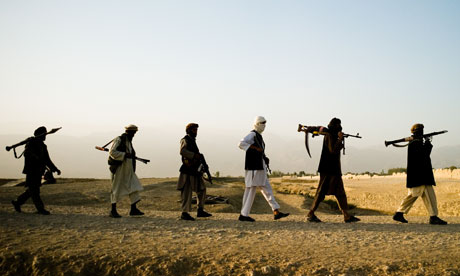
The Munich Security Conference adopted its characteristically upbeat tone on Afghanistan once again this year. From President Hamid Karzai down, one speaker after another agreed that the strategy was working and steady progress was being made.
Karzai himself insisted his people were telling him that security was better than the year before, which was in turn better than the year before that.
For another point of view, it is worth taking a look at a new paper out today by New York University's Centre on International Cooperation. It is titled: "Separating the Taliban from al-Qaida; the core of success in Afghanistan" and essentially argues that the current "surge" is taking the US and Nato further away from that critical goal.
The authors, Alex Strick van Linschoten and Felix Kuehn are researchers and writers based in Kandahar, and consequently have better access to the Taliban that just about anyone else writing on the subject.
They point out that when Osama bin Laden and his followers arrived in Afghanistan from Sudan in 1996, they landed in Jalalabad where they were hosted by mujahedin commanders bin Laden knew from the war against the Soviet Union, not by the Taliban.
En route to capture Kabul in September 1996, the Taliban took Jalalabad, thus inheriting custody of bin Laden and the group around him.
When the Taliban did inherit al-Qaida, they were split on how to deal with it. While Mullah Omar saw bin Laden "as an important connector to the wider Muslim world", a group around Mullah Mohammad Rabbani viewed him as nothing but trouble and an obstacle to international recognition. But Rabbani died in April 2001, marginalizing the internal opposition to the link and effectively sealing the fate of the Taliban regime.
When the US and its allies attacked, many Taliban went back to their villages, but the Bush policy of making no distinction between Taliban and al-Qaida meant they were often tracked down by US Special Forces. Sitting it out was not an option.
The paper makes the argument that the Taliban insurgency was avoidable and that separating the old-school Taliban leaders from al-Qaida is not impossible. It lists the signs the Taliban have sent to that effect, but says the leadership will play that card at the end of negotiations, not at the start.
The authors even quote "a senior Taliban political strategist" as envisioning the movement one day conducting counter-terrorist operations against al-Qaida, with US special forces along the Afghanistan-Pakistan border.
While this idea seems impossible to implement at present, it signifies considerable flexibility within the senior Taliban leadership
However, the authors argue that the 'decapitation strategy' pursued by US and Nato troops under General David Petraeus is making an eventual deal less likely. While there is ample manpower to fill the places of Taliban commanders killed and captured, the influx of more ideological and less nationalistic young members has weakened the leadership.
The likely outcome Strick and Kuehn say, is "a still growing and ever more radical and largely leaderless insurgency".
If a political settlement is indeed being sought, there is little sense in trying to destroy the organisations one wants to talk to
This argument is portrayed as dangerously illogical by most of the US and Nato military leadership, who say the Taliban will never negotiate unless and until they feel they are losing.
I talked to a member of the international contact group in Munich over the weekend who took a middle view. Military pressure is essential he says, but he could see a situation in which the pressure, and the manner in which it is applied, becomes counter-productive. "That time is approaching," he said.

No comments:
Post a Comment